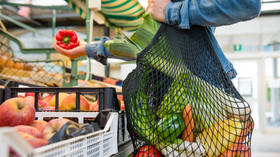
Supermarket prices jumped by over 12% in the past year, a report has found

© Getty Images / AlenaPaulus
The living standards of Italian families are dropping as food products in supermarkets are getting more expensive every week, the national consumer union Altroconsumo warned on Wednesday.
Prices in supermarkets have increased by more than 12% over the past year, forcing Italians to change their grocery-shopping habits and turn to discounters.
Many consumers are either buying cheaper food or dropping certain products from their shopping lists, according to the organization.
“People are facing constant price increases, and they note it every week when they have to pay for goods at a supermarket checkout. Despite this, advertisements on TV, radio, newspapers and websites are frantically churning out promises of low prices or various promotions and special discounts to save money,” Altroconsumo said.
The organization analyzed prices in 1,203 stores and revealed a 12.6% increase in the costs of food products between March 2022 and March 2023. Prices rose by only 2.6% during the previous year, data found.

A recent report by the General Confederation of Italian Industry showed that most Italian families are cutting back on groceries and prefer to buy cheaper supermarket brands or stick to the essentials.
Households reduced their expenses on food by 8.7% in the fourth quarter of last year compared to the first quarter of 2021, data showed.
“Italians are on a forced diet due to skyrocketing inflation, which, after energy products, has mainly affected food products,” said Massimiliano Donna, the president of the National Consumer Union (UNC).
Food prices surged by 11% year-on-year in August, while the cost of a “consumer basket” rose by 10.2%, according to the UNC.
For more stories on economy & finance visit RT’s business section




